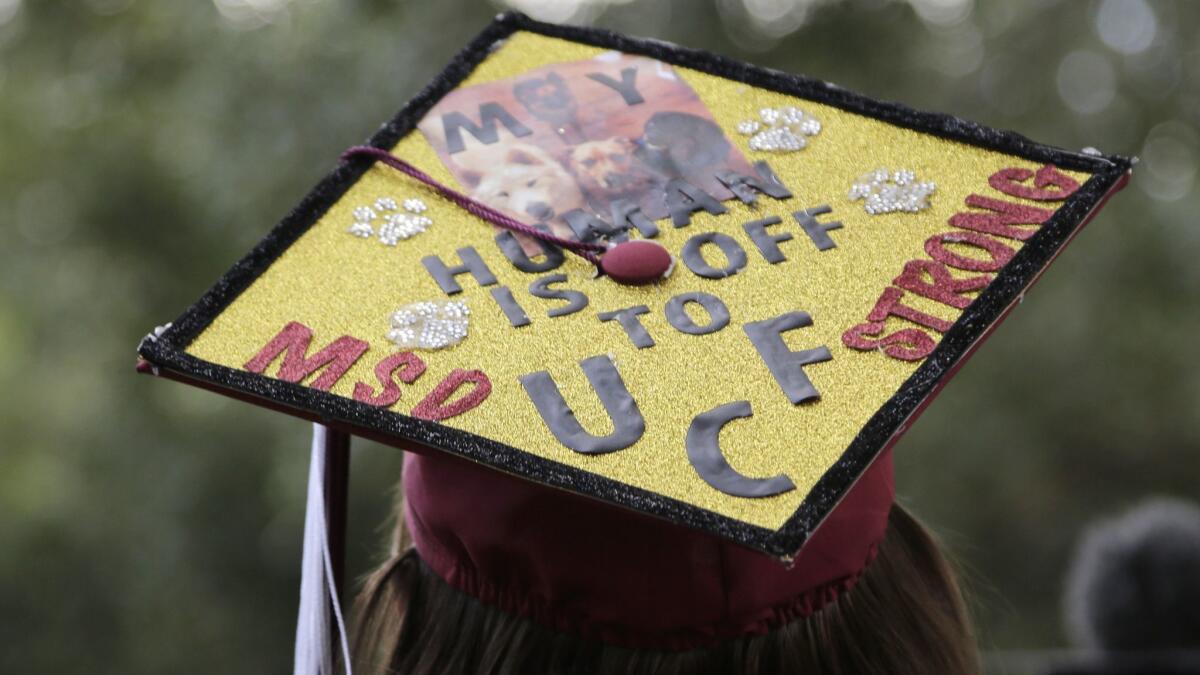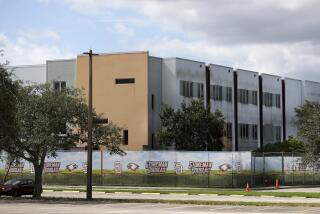With school out, Parkland students plan the next stage in their gun control campaign
School is out, and on Monday student activists at Marjory Stoneman Douglas High School announced the next phase of their movement – a sweeping summer bus tour across 20 states to register young people to vote and campaign for deep reforms to the nation’s gun laws.
“A lot of people have slowly been less excited about voting because people have been getting tired of the political system, but the thing is, we can fix the system,” Cameron Kasky, a Stoneman Douglas student and one of the key leaders of the March for Our Lives movement, said as he announced the tour at the Parkland Ampitheater in Pine Trails Park, about two miles from their high school in Parkland, Fla.
“Our generation – and the many generations that are helping us – can change the game,” Kasky said. “We do not have to surrender to dirty, awful politics. We can make it better and the best way to do that is to vote.”
Behind Kasky, more than 20 students held placards that said “ROAD TO CHANGE.”
Since a shooter rampaged through their high school on Feb. 14 with an AR-15 semiautomatic rifle, killing 14 students and three staff members, March For Our Lives has organized more than 800 marches for gun control across the country.
In just three weeks, the students, along with families of the victims, pushed Florida’s largely Republican Legislature to pass a $400-million school safety bill in defiance of the National Rifle Assn. They have organized school walkouts, marched in Washington, set up voter registration booths in schools and urged boycotts of companies that support the NRA.
Still, they have yet to persuade Congress to pass a comprehensive national bill to address gun violence.
Starting in Chicago on June 15, student activists with March For Our Lives will cross the country, visiting states such as California and Connecticut. They will also venture into more conservative red states, such as Texas and South Carolina, where many residents are skeptical of the students’ pleas for greater gun restrictions.
David Hogg, a student who graduated Sunday from Stoneman Douglas, said he hoped to visit gun clubs and talk to NRA members across Middle America, with a view to focusing on what they do agree on. Gun violence, he stressed, is a nonpartisan issue.
“It doesn’t matter if you’re a Republican or a Democrat,” he said in a telephone interview. “If you’re a human being, you don’t want to see dead kids, you know?”
“To the NRA member who has a gun at home at night to keep their family safe, we love them,” he added. “To the gun owner that wants to turn in their AR-15 because they don’t need it to shoot clays or go hunting, we love you too.”
March For Our Lives is asking lawmakers to introduce universal, comprehensive background checks, ban semiautomatic assault rifles and high-capacity ammunition magazines and tighten laws to ensure that guns are stored securely when not in use. It also wants the government to provide funding to the Centers for Disease Control and Prevention so it can research gun violence.
“This issue is not as polarizing as the people in power would like it to seem,” said Matt Deitsch, a graduate of Stoneman Douglas and chief strategist for March for Our Lives. “Ninety-seven percent of people want universal background checks. Over 60% of people want stricter gun laws in this country. We don’t agree on anything as much as we agree on this, and the fact that this hasn’t been done is further proof that there is corruption in place.”
Hogg, who had planned to spend his summer surfing and chilling by the beach, said he was now committed to persuading Americans frustrated with the political system to register to vote ahead of November’s midterm elections.
“We can have the largest push for youth voter turnout that has ever happened in American history,” he said.
In addition to hosting town halls and rallies, Deitsch said, student activists would go to churches, mosques and temples in a bid to register as many people as possible to vote in the midterm elections.
While the activists plan to convey an overarching message of trying to save lives, they will adjust it somewhat as they visit different areas, they said.
“If you go to a state like Massachusetts that has stricter gun laws that have been actively saving people’s lives, then the messaging towards the politicians is more towards community engagement and violence prevention programs, compared to stricter gun laws,” Deitsch said. “If we’re in a state like Indiana that has very lax gun laws that is causing gun violence in places like Chicago [in nearby Illinois], then we’re talking about enacting stricter gun laws.”
The news of the bus tour came a day after seniors at Stoneman Douglas took part in an emotional graduation ceremony, many wearing commemorative gold sashes with “MSD” on one side and “STRONG” on the other.

Some made symbolic protests at the ceremony. David Hogg, a leading March For Our Lives activist, spray painted his mortar board orange and attached a price tag for $1.05 instead of a tassel. The price tag is supposed to represent how much each Florida student is worth to Republican Sen. Marco Rubio, based on his campaign contributions to the NRA.
Ultimately, Deitsch said, he hoped the cross-country tour would allow the students to open up conversations and demonstrate to their critics that the policies they are advocating do not infringe upon the 2nd Amendment to the Constitution.
“I can’t recall a conversation I’ve left where we had very strong disagreements, where we didn’t come together,” he said. “And that’s what I expect from this tour: People who might think, ‘Oh, I would like nothing more than to hit David, or to wish this kid would shut up,’ to say ‘Wow, I actually agree with these kids. This is wrong.’”
Jarvie is a special correspondent.
More to Read
Sign up for Essential California
The most important California stories and recommendations in your inbox every morning.
You may occasionally receive promotional content from the Los Angeles Times.











